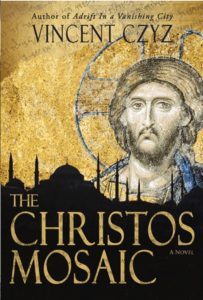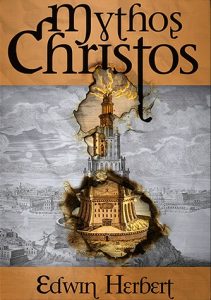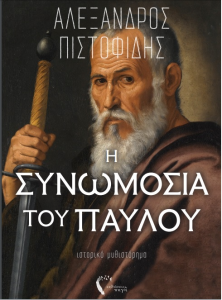We have novels about Jesus or about people in his generation and now we also have novels that embrace mythicist arguments.
So if you would like to learn key mythicist arguments without a poring through academic style articles and books or even if you are just interested in seeing what others make of the possibilities that mythicist arguments generate then check out The Christos Mosaic by Vincent Czyz and Mythos Christos by Edwin Herbert.
 The first of these novels, The Christos Mosaic by Vincent Czyz, is woven principally around the arguments of Earl Doherty Vincent adds at the end of his novel a biographical essay discussing mythicism more generally and specifically what led him to “the mythicist camp”. (He gives special credit to Earl Doherty and Robert Price; though also discusses other authors — along with Bart Ehrman’s attempt to refute the idea and the serious shortcomings of that attempt. Other names who find a place in Vincent’s thinking are Robert Eisenman, Frank Zindler, and non-mythicists like Helmut Koester and Walter Burkett.
The first of these novels, The Christos Mosaic by Vincent Czyz, is woven principally around the arguments of Earl Doherty Vincent adds at the end of his novel a biographical essay discussing mythicism more generally and specifically what led him to “the mythicist camp”. (He gives special credit to Earl Doherty and Robert Price; though also discusses other authors — along with Bart Ehrman’s attempt to refute the idea and the serious shortcomings of that attempt. Other names who find a place in Vincent’s thinking are Robert Eisenman, Frank Zindler, and non-mythicists like Helmut Koester and Walter Burkett.
You can read more details about the book and its author at the Christos Mosaic website.
 The other novel, Mythos Christos by Edwin Herbert, is made up of what some might consider a more colorful (if less plausible) series of adventures than Vincent’s novel, but it does draw the reader into the life of Alexandria of late antiquity. I found those historical scenes recreating the conflicts between traditionalists and the newly emerging Christian forces some of the most memorable.
The other novel, Mythos Christos by Edwin Herbert, is made up of what some might consider a more colorful (if less plausible) series of adventures than Vincent’s novel, but it does draw the reader into the life of Alexandria of late antiquity. I found those historical scenes recreating the conflicts between traditionalists and the newly emerging Christian forces some of the most memorable.
Edwin takes a few liberties with his historical reconstructions but happily for the benefit of the unwary he confesses to these with explanations at the end.
Again, more details about both book and author are posted on the Christos Mythos website.
Some readers will be aware of a Greek mythicist site, ΕΛΛΗΝΕΣ ΜΥ0ΙΚΙΣΤΕΣ / GREEK MYTHICISTS. See Jesus Mythicism: An Introduction by Minas Papageorgiou for an earlier post related to this site and a publication they produced that includes a section on yours truly and this blog. That same site is now proudly announcing the first Greek mythicist novel that translates into Paul’s Conspiracy. It is by Alexander Pistofides and is scheduled to be available this month. Hopefully an English version will appear soon.
The following description of the novel is from Minas Papageorgiou:
The plot takes place in Rome in the middle of the first century of the Christian era, where actual historical Roman politicians and intellectuals, investigate the murder of the emperor Nero. Central to their plans will be the apostle Paul, a missionary preacher of a fast spreading Jewish heretical sect, a fact that will bring the protagonists in front of monumental conclusions regarding the clash between East and West, the conditions wherein Christianity developed and the historicity of Jesus himself. It is worthwhile mentioning that in the novel, hundreds of footnotes are included, so the reader will be able to combine the intense narrative action with actual historical knowledge. . . .
Following is the text from the back cover of “Paul’s Conspiracy”
We are in the middle of the first Century of the Christian era. The Christian movement is gaining more and more ground, making inroads even in Rome itself. Central to our story is the apostle Paul, who is the most important representative of the Christians. His presence, his actions and his words raise the interest of a group of prominent Romans, actual historical people, who plan methodically the assassination of the emperor Nero.
Through vigorous dialog and fast action, the protagonists bring to the forefront a series of exciting issues which take us back 2000 years; the clash between West and East, the relationship of the Greco-Roman world with Christianity, the similarities of the last with Mithraism and with the cult of Dionysus, unknown sides to the character of Paul, and even striking revelations for the actual person of Jesus.
Having completed a lengthy and exhausting historical research of the primary sources and ancient epistolography, Alexander Pistofides presents for the Greek reading audience an artfully crafted historical thriller, full of religious mysteries and symbolisms.
If you enjoyed this post, please consider donating to Vridar. Thanks!


Are these like the Kingdom of the Wicked – Burgess?
Thanks for sharing these books.
After I read your post, I ordered Czyz’s book “The Christos Mosaic.” I enjoyed it very much. I was pleasantly surprised to see a reference by Czyz to “The Bacchae” where Czyz quotes Cadmus as saying “Even if this Dionysus is no God, as you assert, persuade yourself that he is. The fiction is a noble one (The Christos Mosaic, 467).” I also liked in when Czyz wrote: “You gotta hand it to Mark – the greatest con job in history (The Christos Mosaic, 491).”
In reading, I was reminded of my 2009 short story “The Eternal Return” here: http://www.caseagainstfaith.com/the-eternal-return.html , as well as my article on “The Noble Lie Theory of Christian Origins” which Carrier said on Twitter was a well researched article on “The Noble Lie Theory of Christian Origins,” here: http://palpatinesway.blogspot.ca/2018/03/examining-easter-peering-behind-veil-of.html